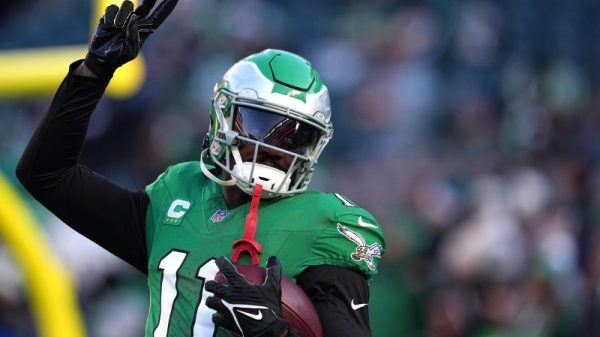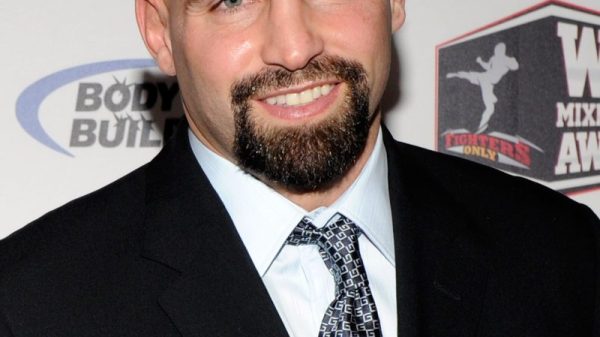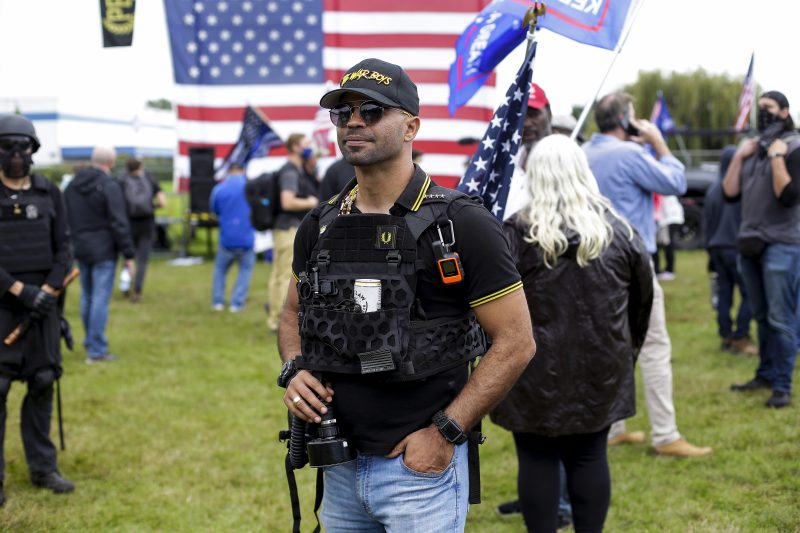The man, going only by “Aaron,” joined a Kansas City chapter of the far-right Proud Boys organization in 2019. He had another relationship that went back a decade, with federal law enforcement.
As Donald Trump’s supporters swarmed the U.S. Capitol on Jan. 6, 2021, Aaron sent a quick series of messages to an FBI agent.
“Barriers down at capitol building,” he said, according to evidence shown in court. “Crowd surged forward. About to [reach] the building now.” He told his FBI handler, “PB did not do it, nor inspire.”
But in one of the most high-profile Jan. 6 prosecutions, it isn’t the government calling its own informants as witnesses. Instead, at least four FBI sources were approached by the defense. Two others are on trial. And it was federal prosecutors who undermined the credibility of a federal informant, suggesting that Aaron had deleted evidence and eliciting testimony that he repeatedly understated his own participation in the riot.
The role reversal underscores the intelligence failures in advance of Jan. 6, as the FBI was unprepared for the riot despite having inroads into the groups now accused by the Justice Department of plotting the violence. The five Proud Boys leaders on trial are accused of seditious conspiracy, a rarely used political charge, in a trial that has lasted nearly three months.
What to know about the Proud Boys sedition trial
End of carousel
Attorneys for the defendants say that there was no intelligence failure — the FBI was surprised because the riot was spontaneous.
“There was a complex network at the government’s disposal, and they detected nothing because there was nothing to detect,” Norm Pattis, who represents Joseph Biggs, said in court last week. Defense attorneys have said in court that they count eight or nine informants referenced during the proceedings — a number that does not include defendants.
Prosecutors say the Proud Boys’ criminal role in the violence is evident from internal communications before and after Jan. 6 as well as video of the group’s leaders at the front of the mob as barriers were breached and windows broken. Government witnesses included a high-level Proud Boy who agreed to plead guilty and cooperate after Jan. 6, but no one identified as an undercover informant.
On cross-examination, Aaron — whose full identity wasn’t revealed in court — acknowledged that a member of his Kansas City Proud Boys chapter “had said some pretty wild things” about violence in advance of Jan. 6 that he did not share with the FBI. He admitted entering the Capitol without FBI authorization and not revealing that he helped prop open a gate for other rioters.
He later tried to justify his actions to agents by saying he thought he could help stop the destruction of “items of historical significance or historical artifacts,” according to the testimony.
The evidence shown in court indicates that many of the FBI sources inside the Proud Boys were asked only about their ideological opponents on the left, even as the right-wing group was implicated in threats and violence at protests across the United States.
Aaron testified Wednesday that before Jan. 6, the FBI never asked him to look for information about the Proud Boys. When he informed his handler that he was coming to D.C. for the protest, he was asked only “to try to see if I could locate someone in D.C. that had nothing to do with the Proud Boys,” he testified.
But he also conceded that he had “zero access” to Proud Boys leaders or members allegedly in charge of planning and organizing for Jan. 6, the defendants in the case, or their communications.
Biggs has said in filings that he agreed to “share information about Antifa networks” with the FBI in 2020. (Tarrio, who cooperated in a federal health-care fraud case before joining the Proud Boys, has also spoken openly about engaging with the FBI in the years since.)
Right-wing activist Jennylyn Salinas was about to take the stand in Tarrio’s defense when prosecutors revealed that she was a paid government informant who had been sharing information with the FBI for the past five years.
Salinas had in recent weeks offered unsolicited legal advice and emotional support to the jailed Proud Boys, and defense attorneys initially expressed fear that she did so for the government’s benefit. Tarrio’s attorney compared the situation to machinations in his home country of Cuba.
But within hours, he was satisfied that Salinas’s FBI handlers had no idea she was involved in the Proud Boys’ defense and had never asked her about Tarrio. Salinas had sworn under oath that she only reported to federal agents on “antifa and the border” — not about the Proud Boys.
“She wasn’t tasked with reporting on Proud Boys,” Judge Timothy J. Kelly said Monday. “Everyone involved has sworn that this didn’t happen, and her contacts with the defense camp are easily explained by her sympathy for the defendants.”
The vice president of the Oath Keepers, also an informant, reported to the FBI concerns about a clash with antifascists in Portland, Ore., in September 2020. Illness prevented him from testifying in defense of leader Stewart Rhodes, who was subsequently convicted of similar charges to those faced by Tarrio, Biggs and three other Proud Boys.
After the death of George Floyd in May of 2020, the Justice Department had singled out far-left antifascists as responsible for violence and destruction at racial justice protests across the country, although there was little evidence of any organized left-wing effort to disrupt those rallies.
That posture “would naturally put pressure on FBI agents working in the domestic terrorism field to find this anti-fascist terrorist menace,” said Michael German, a former undercover agent who has long argued that the FBI’s counterterrorism efforts are misguided. “It didn’t seem like the FBI was interested in pursuing cases against the Proud Boys. While at the same time they were aggressively infiltrating less violent groups, with less organization.”
The Intercept recently reported that a man with a violent criminal history was paid by the FBI to infiltrate left-wing protest groups in Denver, where he encouraged using force.
Salinas was ultimately not called to testify, after Kelly blocked questioning about her relationship with the FBI.
Proud Boy Matthew Walter of Tennessee was also a potential defense witness. He said that while there was “not any sort of CHS relationship” — using the acronym for confidential human informant — he had several conversations with an FBI agent between August 2020 and January 2021.
“The rules were, don’t ask me about the Proud Boys,” Walter said. “They didn’t want to know about the Proud Boys, they wanted to know about antifa.”
In accordance with those rules, Walter said the only questions he was asked about Jan. 6 were, in advance, whether he was going, and after, whether he had committed any crimes. Otherwise, he said, “it was radio silent.” He volunteered that he did not believe the Proud Boys leaders were responsible for what happened.
Another FBI informant, according to evidence presented in court, drove Tarrio from the D.C. jail to Baltimore on Jan. 5; in between was a parking-lot meeting between the Proud Boys leader and Rhodes heavily scrutinized by federal investigators. But the informant, Kenny Lizardo, was subpoenaed by the defense — a move he successfully fought by arguing he could incriminate himself.
Tom O’Connor, who investigated terrorism for the FBI for two decades, said agents follow “very strict guidelines” when using informants to monitor domestic extremist organizations “because the groups themselves are protected by the First Amendment in the vast majority of cases.” Moreover, he said, sources choose what to reveal; agents “don’t have a crystal ball to see what they know.”
Informants in other right-wing extremist groups did report warnings about Jan. 6 to the FBI that were largely ignored as protected speech. A tip from inside the Oath Keepers was not followed up on until after the riot.
Authorities have relied on informant testimony in other cases involving violent far-right movements, with mixed results.
Prosecutors say an informant was key to building a case against former Army Pvt. Ethan Melzer, who this month was sentenced to 45 years in prison for sharing sensitive information about a U.S. military installation as part of a neo-Nazi group’s plot to ambush troops. An informant also recently helped federal prosecutors charge a white supremacist with planning to attack the Baltimore power grid.
However, as the Proud Boy trial show, informants can be a gamble. Extremism monitors point to cases undermined by informants who turned out to be dangerous, flaky or seen as crossing the line between investigation and entrapment.
Amy Cooter, a researcher at Middlebury Institute’s Center on Terrorism, Extremism, and Counterterrorism, has written extensively about the Justice Department’s failed 2012 prosecution of members of the Hutaree militia group accused of plotting a violent revolt against the government, a case that relied heavily on an undercover agent and a paid infiltrator. A federal judge ultimately dismissed all major counts, in part because “a defendant cannot be convicted of conspiring with someone working on behalf of law enforcement.”
Public reaction to the trial, Cooter found, was that the case against the Hutaree was “exaggerated, at best, and the result of entrapment, at worst.”
The picture appears to be shifting, Cooter said, in tandem with growing public awareness of the risks posted by armed extremist movements. Perhaps the most similar recent example was the prosecution of members of a far-right militia group in connection with a kidnapping plot against Michigan Gov. Gretchen Whitmer (D) in 2020.
Fourteen people were arrested after a sting involving at least a dozen paid confidential informants. Several plants in the group proved unreliable, with one labeled by prosecutors a “double agent.” Two men were acquitted — but others have been convicted, and more are set for trial.
“It does seem like more people are aware of the threats that can come from groups like this and perhaps are more willing to overlook some of those glitches, let’s call them, in the interest of thinking about the bigger picture of safety,” Cooter said.
Devlin Barrett and Tom Jackman contributed to this report.



























